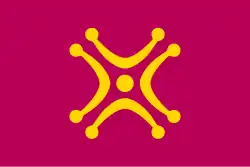Cantabrian people
 | |
| Total population | |
|---|---|
| 593,121 (Cantabria 2011) | |
| Regions with significant populations | |
| In Spain: Cantabria; Madrid, Biscay, Asturias, Barcelona.[1] Diaspora | |
| 8,131[1] | |
| 3,384[1] | |
| 2,384[1] | |
| 1,899[1] | |
| 1,490[1] | |
| 1,283[1] | |
| 1,190[1] | |
| Other countries | 3,099[1] |
| Languages | |
| Castilian, Cantabrian. | |
| Religion | |
| Roman Catholicism[2] | |
| Related ethnic groups | |
| other Spaniards (Asturians, Galicians, Leonese, Castilians) | |
The Cantabrians (Cantabrian and Spanish: cántabros) are the people who inhabit the autonomous community of Cantabria, in northern Spain.[3] Sometimes they are referred to as "montañeses" (meaning Highlanders). The traditional dialects in this region, known as Cantabru or Montañés, are related to the Astur-Leonese languages.
References
- ^ a b c d e f g h i Elecciones a Cortes Generales de 20 de noviembre de 2011
- ^ Interactivo: Creencias y prácticas religiosas en España
- ^ "Even today, Cantabrians (the Pasiego included, Lebaniegos excluded), at the North of Spain, seem to be a genetically well differentiated community, as deduced from uniparental and autosomal markers, perhaps to a higher degree than their neighbours, the Basques". http://grupos.unican.es/acanto/aep/bolpas/Ann-Hum-Genet.pdf Archived 2007-04-04 at the Wayback Machine.